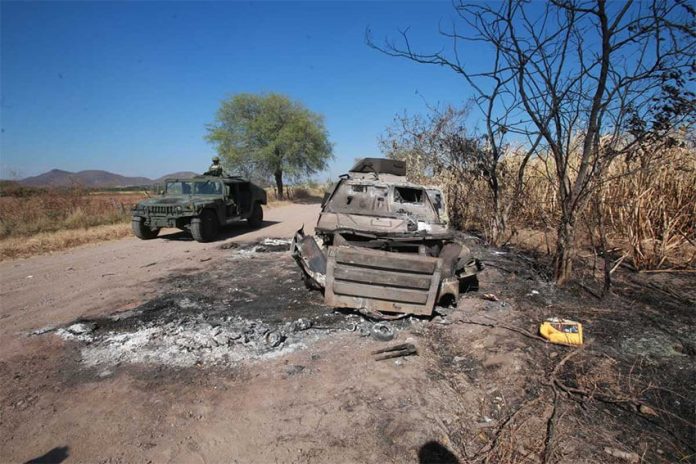The Jalisco New Generation Cartel (CJNG) is now using land mines in its fight against official security forces in Michoacán.
One explosive that detonated last Saturday damaged an armored army vehicle and injured 10 soldiers.
The mines used by the CJNG – generally considered Mexico’s most powerful criminal organization – are similar to those deployed by Iraqi insurgents and organizations such as Al-Qaeda and the Taliban in wars against the United States in Iraq and Afghanistan over the past two decades, although not as powerful, the newspaper Milenio reported.
The army defused 12 handmade mines on Wednesday in the municipality of Tepalcatepec, located in the notoriously violent Tierra Caliente region where the CJNG is engaged in a turf war with the Cárteles Unidos.
Security sources cited by Milenio said the explosives consist of pipes filled with gunpowder, two-millimeter-thick pieces of metal, batteries, a detonator and other items. The pipe bombs, concealed under dirt or other organic materials, explode upon contact.
One such land mine exploded Saturday when an army Sand Cat vehicle drove over it, Milenio reported. Its armor allowed the soldiers to avoid life-threatening injuries.

The CJNG also uses explosive-laden drones in its fight against rival criminal groups and authorities. The cartel recently used a drone to bomb an encampment of displaced people in Tepalcatepec.
Security officials who spoke with Milenio said they suspect a “technical advisor” is guiding the CJNG in its use of new technologies.
Daniel Castillo Santander, an academic who specializes in organized crime, compared the Jalisco cartel’s tactics to those used against the United States military in Iraq in the first decade of the century.
“Let’s remember what happened to the United States army, the greatest military power; when it went into Iraq, when they said ‘we’ve won the war, we don’t have any visible enemy,’ the insurgents started to adapt, to generate new tactics and they made these mines. … What’s happening in Michoacán? The [CJNG] is adapting very cheap technologies to hold back the military presence in the region,” he told Milenio.
“What do you create? It’s not so much the impact of saying ‘I destroyed three cars,’ but rather … the psychological terror that a drone … [with] dynamite … or putting mines on the road creates,” Castillo said.
Michoacán Governor Alfredo Ramírez Bedolla said earlier this week that pacifying Michoacán might take six years.
The state was the third most violent in Mexico last year with more than 2,700 homicides, and had a bloody start to 2022 with over 200 murders in January.
The CJNG is one of the fastest growing and most dominant criminal organizations in Mexico, according to the United States Drug Enforcement Administration.
“CJNG has a significant presence in 23 of the 32 Mexican states. … The CJNG’s rapid expansion of its drug trafficking activities is characterized by the group’s willingness to engage in violent confrontations with Mexican government security forces and rival cartels,” the DEA said in its 2020 National Drug Threat Assessment, published in March 2021.
With reports from Milenio
